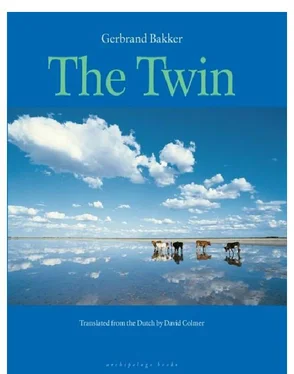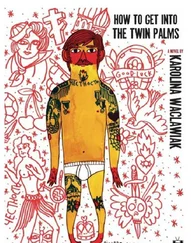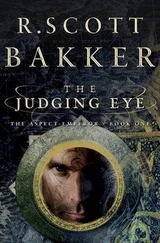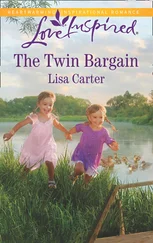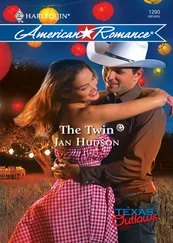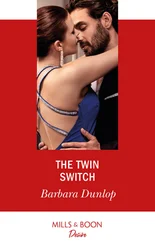“A canoe.” He lights a fresh cigarette and looks at the canal through the front window.
“You have to take advantage of weather like this.”
“How do I get there?”
“Right at the end of the road, then straight ahead and in Broek it’s the seventh house on the left. You can take a route that comes past here.”
“Do you want me out of the way?” he asks.
“What for? You never go anywhere. You’ve only been to Monnickendam.”
“You’re still a bastard.”
“Sure. Maybe I am.”
Just before he gets on the bike, I give him fifty euros in ten-euro notes. His coat is in a plastic bag hanging from the handlebars. He rides out of the barn with a wide curve. I stroll over to the chicken coop and pick up four eggs. I take the eggs inside, put them in an empty egg box and leave it next to the stove. I take off my overalls, lie down on the sofa and close my eyes. It will take him a while to get back here.
It’s April 16th and a young lad passes in a canoe. That doesn’t happen often, especially not this early in the season because the official canoeing routes don’t pass my farm. He has taken off his shirt, it’s unusually warm for the time of the year. I’m standing at the side of the house, on the north side, as yet unseen. Because the canoeist is alone, there’s no talking. He doesn’t make any comments about my farm, the trees or my two donkeys. A hooded crow sits on a branch in the crooked ash. The crow is preening itself and now and then pulls its large beak out from under its wings to check the progress of the canoe. The paddle doesn’t slap at the yellow water lilies; there aren’t any yellow water lilies in April. There aren’t any noisy redshanks either; there are two oystercatchers in the field on the other side of the canal, calmly foraging.
The young man has ginger hair and sunburnt shoulders, he has underestimated the strength of the spring sun. The paddle is resting on the canoe in front of him, water drips into water. The canoe slides forward slowly. There’s nowhere for me to go, there’s nothing on the bare north side of the house that I could be working on. I don’t want to go anywhere. I want to stand here and be seen.
He sees me. His canoe gets caught with its nose against the side of the canal. He looks at me and he looks at the dormer window. He looks at the hooded crow, at the trees lining the yard, he even looks — if briefly — at the two inquisitive donkeys that have come to stand at the new fence along the road. I can’t tell whether he is surprised to see me here. He doesn’t raise a hand, I don’t raise one either. If it’s worked out, he sees what he is seeing as an old, yellowed postcard, with buildings, people, animals and trees frozen in time. Something to pick up for a moment and then lay aside again. A place with nothing to offer him.
Then he picks up the paddle and pushes off from the bank. A little later he turns right, into Opperwoud Canal. He must have studied the map carefully. I walk up to the road to watch him. Opperwoud Canal empties into Big Lake. Past Big Lake is a narrow ditch, whose name I don’t know, that leads to the Die near Uitdam. Beyond Uitdam is Lake IJssel.
He comes into the shed when I’m almost finished milking. He stays standing there just past the open sliding door. The sun is around him, I see only a silhouette. I feel the weight of my twenty cows, the weight of the straw in the hayloft, the heavy rafters, the tiles on the roof (not one of which is crooked), the neatly pollarded willows. I can hardly stand.
“You want me gone,” he says.
“Yes,” I say, lowering the milking claw to the floor.
“Shit.”
When will the swallows arrive? Or have they already come? I wonder. I’ve lost my sense of time. It’s summer outside.
“It’s almost over,” says Father.
“Yeah,” I say, thinking of earlier in the day.
The window is wide open.
I correct myself. “Yeah?”
“And I haven’t had a spring, but a summer instead.”
“Are you going to eat your egg?”
“Soon. I’m going to look at it for a while first.”
I have already shelled the egg for him. It is lying on a saucer and the salt dish is next to the saucer. Mosquitoes dance in front of the open window. I’ve sat down on the foot of the bed. He says he’s going to look at the egg, but he looks at me. The sheet of paper is no longer sticking out from under the bedside cabinet. I wonder where the poem has got to.
“Will you manage on your own?”
“I think so.”
“You’re a grown man.”
“Half a grown man.”
Now he looks at the egg as if he’s got a little marzipan cake in front of him, the kind the baker in Monnickendam calls “castles.” In the old days he would sometimes drive all the way into town on a Saturday to buy four. On some occasions he might have got five. Later it became three and, after Mother died, very rarely, he went in for two. I never told him that castles were not my favorite cake.
“I was second choice,” I say. “That was the worst. Always feeling I wasn’t good enough.”
“I did my best,” he says.
“And I didn’t?”
“Of course you did. We all did.” There’s a lot more life in him now than there was this morning.
“Where’s Henk?”
“I don’t know. Outside, I think.”
There is something I want to ask him. Despite everything, there is something I want his permission for. “Shall I. .” I say. I stand up, go down on my knees and stick my head under the bed. There’s the poem, covered with fluff. I stand up and sit back down on the bed, close to his feet. He’s still staring at the egg, a bit frightened now.
“Father, shall I sell up?”
“Feel free, son. Feel free.” He takes the saucer off the bedside cabinet with his claw hand and puts it on his lap. The egg rolls onto the blanket. “Dead is dead,” he says. “Gone is gone and then I won’t even know about it.” He gropes for the egg and lays it back neatly on the saucer. “You have to decide for yourself.”
I stand up. Watching him eat the egg is too much for me.
For weeks now he hasn’t said a word about the hooded crow. It’s as if he’s forgotten it.
Henk isn’t outside. Henk is in the kitchen, half sitting on the worktop. In his right hand he is holding a torn-open envelope, in his left he has my letter to his mother, which I should have posted in time for today’s collection. He has already changed: exactly the same but different, the way a house seems strange when you’ve spent a day somewhere unfamiliar. The farmhouse seemed different to me after the old tanker driver’s funeral, after skating on Big Lake and after picking Riet up from the ferry. I realize now that I felt just the same when I came home after picking up Henk. I haven’t worked out why that is. Maybe because you yourself have grown older, even if just a few hours (I had already got that far) and everything at home has stayed still, except the hands of the clock. Then it takes a while to smooth over the time you’ve missed at home.
I’m not going to tell him that it’s rude to open other people’s letters. I notice now that his forehead and nose are burned as well. He turns away, screwing up the letter as he turns. I recognize the gesture, but unlike Father almost forty years ago, Henk is carrying a lighter. He pulls it out of his back pocket and holds the flame under the piece of paper, letting go just before he burns his fingers. The letter burns away in the sink.
“What kind of letter was that?” asks Henk. “Do you think my mother would have understood any of it?”
“The last bit, at least.”
“There’s no need,” he says. “You should be glad I’ve burned it.”
“What do you mean, there’s no need?”
Читать дальше
